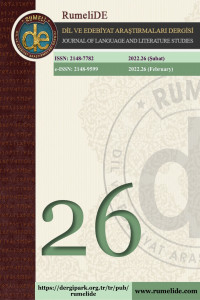Abstract
Ziya Paşa’nın Terci-i bend’i, hem kendi dünya görüşü hem de İslâm âleminin hayat anlayışını ifade etmesi bakımından dikkate değerdir. 1829 doğumlu Ziya Paşa, iyi bir eğitim alır ve Sadaret Mektubi Kalemi’nde çalışmaya başlar. Encümen-i Şuara mensupları, dönemin tanınmış şair ve edebiyatçıları ile tanışarak, klasik edebiyat kültürünü geliştirir. Mustafa Reşit Paşa’nın önayak olmasıyla sarayda kâtip olarak çalışır. Âli Paşa ile anlaşmazlıkları büyüyünce, İstanbul’dan uzaklaştırılır. V. Murat’ın tahta geçmesiyle de Maarif müsteşarlığına atanır; II. Abdülhamit’in padişah olmasıyla da Kanun-ı Esasi Encümeni’nde çalışır ve Adana’ya vali olur. İkbal ve idbâr merhaleleri arasında geçen siyasî gelgitlerle dolu hayat tecrübeleri edinen Ziya Paşa, Terci-i bend’inde kendi “ben” duygusunun yanı sıra tasavvuf meselelerine dair bilgileri ve görüşleri konu edinir. Tanrı’nın mutlak egemenliği, insan ruhu, adalet fikri, zalim-mazlum tezatlığı, akıl, irade, ibret alma fikri gibi metafizik konularındaki hissiyatını ve fikirlerini işler. Terci-i bend’inde konu ettiği tasavvuf meseleleri, İslâm âleminin hayat anlayışını ve şark felsefesinin bazı zihniyet meselelerini, konu etmesi bakımından dikkate değerdir. Tasavvuf inancı, zaman içinde toplumun duygu ve düşünce sınırlarını geniş ölçüde etkileyerek, dinî-tasavvufî terimler yoluyla da dilimizi zenginleştirmiştir. Tasavvuf anlayışı ve terimleri, insanı sevgi ve umut merkezine koyan düşünce tarzı; Yaratan’ı, insanı, dünyayı ve kâinatı tefekküre geniş bir imkân sağlar. Bu bağlamda Kur’ân-ı Kerîm ve hadis-i şerifler, menkıbelerle tasavvufî anlayış, Türk edebiyatını da yoğurarak, bu edebiyata insanî ve fikrî bir yön vererek, kaynaklık etmiştir. Çalışmamızda, tasavvufî anlayışı ve bu anlayışın terminolojisini bilen Ziya Paşa’nın Terci-i bend’inde geçen tasavvuf bilgilerini ve terimlerini tematik bir inceleme konusu yaptık.
References
- Ayverdi, İ. (2006). Misalli Büyük Türkçe Sözlük, (Cilt 3, s. 3040, s. 3152). İstanbul: Kubbealtı.
- Aytaç. G. (2005). Edebiyat ve Kültür, Ankara: Hece.
- Aytaç. G. (2016). Genel Edebiyat Bilimi, Ankara: Doğu Batı.
- Bilge, M. (1984). İlk Osmanlı Medreseleri, İstanbul: Edebiyat Fakültesi.
- Çiğdem, Ahmet. (1993). Aydınlanma Felsefesi, İstanbul: Ağaç.
- Demirli, E. (2012). Vahdet-i Vücûd Maddesi, TDV İslâm Ansiklopedisi, (Cilt 42, s. 431-435).
- Eagleton, T. (2011). Edebiyat Kuramı Giriş, Çev.: Tuncay Birkan, İstanbul: Ayrıntı.
- Gölpınarlı, A. (2020), Tasavvuf Meseleleri, Sorular ve Cevaplarla, İstanbul: Kapı.
- Karaağaç, G. (2013). Dil Bilimi Terimleri Sözlüğü, Ankara: Türk Dil Kurumu.
- Tanpınar, A. (2020). XIX. Asır Türk Edebiyatı Tarihi, İstanbul: Dergâh.
- Tanpınar, A. (2005). Edebiyat Üzerine Makaleler, İstanbul: Dergâh.
- Uçman, A. (2013). Ziya Paşa Maddesi, TDV İslâm Ansiklopedisi, (Cilt 44, s. 475-479).
- Uzun, M. İ. (2011). Terci-i Bend Maddesi, TDV İslâm Ansiklopedisi, (Cilt 40, s. 487-489).
- Ülgener, S. F. (2006). Zihniyet, Aydınlar ve İzm’ler, Ankara: Derin.
- Ziya Paşa. (1939). Terci-i Bend ve Terkib-i Bend, Haz.: Mitat Sadullah Sander, İstanbul: Tefeyyüz
Abstract
Ziya Pasha's Terci-i bend is in terms of expressing both his worldview and the understanding of life of the Islamic world. Born in 1829, Ziya Pasha received a good education and started working at the Grand Vizier's Office. Members of the Council of the Union develop the culture of classical literature by meeting with the well-known poets and writers of the period. With the initiative of Mustafa Reşit Pasha, he works as a clerk in the palace. When his disagreements with Âli Pasha grow, he is removed from Istanbul. With the accession of Murat V, he was appointed as the Undersecretary of Education; after, II. Abdülhamit became the sultan, he worked in the Kanun-ı Esasi Committee and became the governor of Adana. Ziya Pasha, who had life experiences full of political ebbs and flows between the stages of ıqbal and idbâr, in his Terci-i bend, besides his own sense of "I", deals with knowledge and views on Sufi issues. He deals with his feelings and ideas on metaphysical subjects such as the absolute sovereignty of God, the human spirit, the idea of justice, the oppressor-oppressed contrast, reason, will, and the idea of taking a lesson. The issues of mysticism that he mentioned in Terci-i bend are noteworthy in that they talk about the understanding of life of the Islamic world and some mentality issues of oriental philosophy. The belief of Sufism has enriched our language through religious-mystical terms, by greatly influencing the emotional and thought boundaries of the society over time. The understanding and terms of Sufism, the way of thinking that puts people in the center of love and hope; It provides a wide opportunity to contemplate the Creator, man, the world and the universe. In this context, Qur'an and hadith-i sharifs, the legends, and the mystical understanding have been a source by kneading Turkish literature, giving this literature a human and intellectual direction. In our study, we made a thematic study of the mystic knowledge and terms in the Terci-i bend of Ziya Pasha, who knew the mystical understanding and the lexicon of this understanding well.
Keywords
References
- Ayverdi, İ. (2006). Misalli Büyük Türkçe Sözlük, (Cilt 3, s. 3040, s. 3152). İstanbul: Kubbealtı.
- Aytaç. G. (2005). Edebiyat ve Kültür, Ankara: Hece.
- Aytaç. G. (2016). Genel Edebiyat Bilimi, Ankara: Doğu Batı.
- Bilge, M. (1984). İlk Osmanlı Medreseleri, İstanbul: Edebiyat Fakültesi.
- Çiğdem, Ahmet. (1993). Aydınlanma Felsefesi, İstanbul: Ağaç.
- Demirli, E. (2012). Vahdet-i Vücûd Maddesi, TDV İslâm Ansiklopedisi, (Cilt 42, s. 431-435).
- Eagleton, T. (2011). Edebiyat Kuramı Giriş, Çev.: Tuncay Birkan, İstanbul: Ayrıntı.
- Gölpınarlı, A. (2020), Tasavvuf Meseleleri, Sorular ve Cevaplarla, İstanbul: Kapı.
- Karaağaç, G. (2013). Dil Bilimi Terimleri Sözlüğü, Ankara: Türk Dil Kurumu.
- Tanpınar, A. (2020). XIX. Asır Türk Edebiyatı Tarihi, İstanbul: Dergâh.
- Tanpınar, A. (2005). Edebiyat Üzerine Makaleler, İstanbul: Dergâh.
- Uçman, A. (2013). Ziya Paşa Maddesi, TDV İslâm Ansiklopedisi, (Cilt 44, s. 475-479).
- Uzun, M. İ. (2011). Terci-i Bend Maddesi, TDV İslâm Ansiklopedisi, (Cilt 40, s. 487-489).
- Ülgener, S. F. (2006). Zihniyet, Aydınlar ve İzm’ler, Ankara: Derin.
- Ziya Paşa. (1939). Terci-i Bend ve Terkib-i Bend, Haz.: Mitat Sadullah Sander, İstanbul: Tefeyyüz
Details
| Primary Language | Turkish |
|---|---|
| Subjects | Linguistics |
| Journal Section | Turkish language, culture and literature |
| Authors | |
| Publication Date | February 21, 2022 |
| Published in Issue | Year 2022 Issue: 26 |


